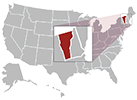
The demand for such technicians is steady and this profession is a good one to break into the healthcare industry.
Read this guide to find out more about the requirements and even the salary!
Page Navigation
Phlebotomist Employment and Job Duties in Vermont
As you know, a phlebotomist draws blood from those visiting the medical facility.
There are many types of medical centers where phlebotomists are needed:
- Hospitals
- Various types of clinics
- Blood banks
- Labs
- Nursing homes
- Community Health Centers
- Doctor’s Offices
As you can see, there are several reasons for which blood must be collected.
You’ll have to complete a variety of other tasks to do too, not just draw blood.
These include:
- Choosing the correct vials
- Correctly labeling samples
- Organizing and sending off samples to the lab for testing
- Communicating with patients
- Ensuring the workplace is clean
- Following strict procedures
The last two points are important because you’ll work in an environment where contamination is easy.
Proper disposal of used needles and other supplies is vital and your responsibility.
Requirements to Become a Phlebotomist in Vermont
Even if in Vermont you don’t need a certification to work as a phlebotomist, you’ll have a very difficult time finding someone willing to hire you.
This is because of the hazardous nature of this occupation.
Employers usually seek a person with:
- A high school diploma or GED
- Specialized training
- Strong communication skills
- Good listening skills
- Pay attention to details
- Other skills decided by the employer
Most of these skills will help you succeed in your job and make patients feel at ease in a stressful situation.
Phlebotomist Training in Vermont
To become certified in phlebotomy, you need to first attend a training program.
The program itself needs to be approved by the National Accrediting Agency for Clinical Laboratory.
To enroll in such a program you might need:
- To pass a drug screening test
- A valid driver’s license
- Good grasp of the English language
- To be at least 18 years old
- Insurance
- Good computer skills
These enrollment requirements will often differ between schools.
Next, you can have a look at the schools that offer this type of training.
8 Phlebotomy Schools in Vermont
| School Name | Address |
|---|---|
| Burlington Technical Center | 52 Institute Road Burlington, VT 05408-2721 |
| Center for Technology | 2 Educational Drive, Suite 200 , Essex Junction, VT 05452 |
| Central Vermont Medical Center | 130 Fisher Road Berlin, VT 05602 |
| Institute for American Apprenticeships at Vermont HITEC | 156 Commerce Street, PO Box 1548, Williston, Vermont 05495 |
| Lyndon Institute | 168 Institute Cir, Lyndon Center, VT 05850 |
| River Bend Career and Technical Center | 36 Oxbow Drive, Bradford , Vermont 05033 |
| University of Vermont Medical Center | 111 Colchester Avenue, Burlington, Vermont 05401 |
| University of Vermont | 85 South Prospect Street Burlington, VT 05405 |
Higher tuition can mean that the following will be provided at no extra cost:
- Exam fees
- Textbooks
- Mandatory equipment
- Uniform for the graduation
You will also attend many classes related on:
- Medical terms
- Anatomy
- Physiology
- Safety procedures
- Pathophysiology
- The 40 most common lab tests
- Types of procedures to draw blood
Some of the institutions can provide classes and certifications for CPR and other small procedures.
You may have to pay extra for these credentials.
Depending on the school, you might be able to obtain an Associate’s degree that will help you with your career advancement later on.
The curriculum needs to also include some laboratory hours as well as an internship.
Most schools help their graduates to find a job as well.
Phlebotomist Certification in Vermont
Not everyone is aware that the best certification to have is the one recognized nationally.
You can earn it through these agencies:
- American Medical Technologists
- American Society for Clinical Pathology
- American Society of Phlebotomy Technicians
- National Phlebotomy Association
The schools mentioned earlier may offer the possibility of earning this national certificate.
Each agency has its own rules when it comes to:
- The type of exams you need to pass
- Certification renewal process and period
Candidates need to know that all the exams have 2 parts and one of them is common among the agencies, namely the practical one.
As a rule of thumb, phlebotomists need to continue their education every year if they want to keep their national certification.
Phlebotomist Salary Information in Vermont
In Vermont, these technicians earn, on average, $33,987 per year.
You can earn more in certain facilities, cities, or if there’s a low number of phlebotomists in your area.
Below you can see how your location can influence how much you’ll earn as a phlebotomist in Vermont.
Annual Salary Range:Average Salary of Phlebotomists in Vermont
| City Name | Salary |
|---|---|
| Burlington | $34,752 |
| Essex | $34,752 |
| South Burlington | $34,752 |
| Colchester | $34,752 |
| Rutland | $35,065 |
| Bennington | $35,669 |
| Brattleboro | $35,776 |
| Milton | $34,731 |
| Essex Junction | $34,752 |
| Hartford | $36,175 |
Additional Information for Phlebotomists in Vermont
Rarely medical staff want to work as phlebotomists for an extended period of time.
They often transition towards higher positions within this field or a completely different field with the right certifications or licenses on hand.
This page is also available in Spanish.







